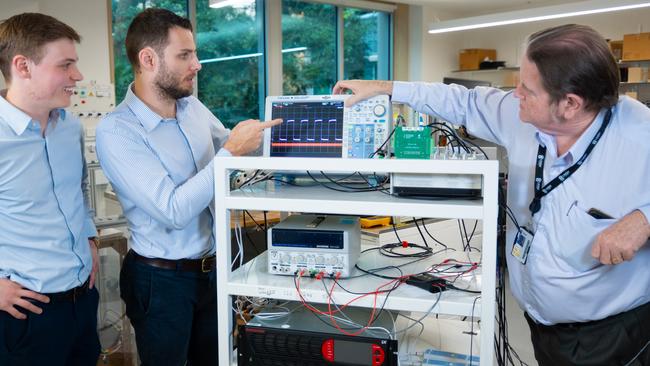UNSW ‘squad’ of engineers to plug green tech gap
The University of NSW is providing electrical engineers to support green tech start-ups to help them commercialise.

A “squad” of University of NSW electrical engineers are providing rapid support to green tech start-ups to help them commercialise, amid a critical shortage of the specialist engineers.
The Technology Translation Squad, supported by a federal government program attempting to fast-track clean energy technologies, offers up to five days of free, low-bureaucracy, tech support for new companies to solve electrical engineering problems in the late stages of product development. These businesses can then enter into paid arrangements with the TTS.
The Australia-first program attempts to bridge the gap between academic research and real-world manufacturing and commercialisation.
Lead technology translator Matthew Priestly said there was a massive skills shortage in electrical engineering, as the nation looks to achieve decarbonisation targets.
“The work required to meet net zero by 2050 is predominantly in electrification, and of course that requires a lot of electrical engineers,” he said.
“And because the manufacturing sector in Australia, particularly in electrical engineering products, is very limited, it means we’ve got very limited deep technical expertise here.
“If an SME or a start-up has an interesting challenge that needs support, really the only option is to go to one of the big consultancy companies, and it’s risky for them because it’s not bread and butter work, and it’s also prohibitively expensive for these young companies.
“At UNSW’s TTS, we only do the innovative stuff. We’re not like a consultancy firm that only takes on projects with financial value. We generally try to take on work that shows high potential to have a positive impact on Australia, our industry partner and the university. We are almost entirely impact-focused.”
Energy storage start-up Green Gravity, which uses gravity to store excess renewable energy when there is an oversupply in the electricity grid, this week signed a $2.2m deal with TTS to help it get to market.
“Working with UNSW gives us access to deep technical expertise, particularly in power systems and grid integration,” Green Gravity founder and CEO Mark Swinnerton said. “Our collaboration brings together industry knowledge and academic research to ensure this technology is efficient, safe and ready for commercial deployment.”
John Fletcher, research lead for the government’s Trailblazer for Recycling and Clean Energy (TRaCE) program, said its model made “university expertise more accessible and responsive to real-world needs”, and that targeted research and development could accelerate the commercialisation of high-impact technologies.
“In doing so, the TTS not only enhances the reputation of universities among Australian businesses, especially in the high-demand fields of decarbonisation and electrification, but also ensures academic knowledge is translated into practical, impactful solutions,” Professor Fletcher said.
TTS has helped 19 start-ups to commercialise since it started last year.




To join the conversation, please log in. Don't have an account? Register
Join the conversation, you are commenting as Logout